- Home
- Richard Adams
The Plague Dogs: A Novel Page 33
The Plague Dogs: A Novel Read online
Page 33
“I don’t wish to discuss it either,” rejoined Annie Mossity. “I hope you’ll soon come to feel sure, as I do, that it’s nothing to do with me and that it’s not my brother’s dog.”
“Well,” said Digby Driver, smiling pleasantly, “well, all right, Mrs. Moss, let’s not trouble our minds about that aspect of the matter at all. I’m not asking you to say yea or nay to that. Let’s agree that we don’t know for certain whether or not the dog you sold to Lawson Park has become one of the Plague Dogs—”
“However many are there, for heaven’s sake?” asked the lady.
“Only two, but that’s definitely two too many, you know. But as I say, let’s leave all that on one side. We’ll agree that it’s not your job or mine to know that, although you can be sure that it’ll be established one way or the other quite soon. Can you help me by telling me something about your poor brother and his dog? His death must have been a terrible shock and grief to you, wasn’t it?”
As he uttered these last words there passed across Annie Mossity’s face a sudden, swiftly suppressed look of incredulity, followed immediately by one of relief. She hesitated before replying and appeared to be pondering. Then, with an air of decision, she said, “It was a dreadful blow; and a dreadful loss. Oh, Mr. Driver, if you don’t mind, I can’t bear to speak of it—”
“No, no, of course not. Forgive me,” said Driver hastily. In the normal way he rather welcomed the tears of the bereaved, since they usually led to freer and more indiscreet speech, and often reduced the interviewee to a defenceless and malleable state. However, this was not what he was after just now. What he wanted was specific information.
“Just tell me a little more about the dog,” he said. “Have you a photograph of it, by any chance?”
“No, I certainly haven’t,” replied Mrs. Moss. “To be perfectly honest, I was only too glad to get rid of it.”
“Ah, that’s interesting,” said Driver. “Why was that? Was it simply because it had been the cause of the fatal accident to your brother, or was there something else?”
“Well-er—”
Annie Mossity cannot be said to have been unconscious, in the psychological sense—though they were certainly not present to her mind at this moment—of the fur-lined boots and gloves which she had bought with the money that Animal Research had paid her for Snitter. Thanks, however, to inveterate vanity and to a long-established capacity for self-deception, she was almost completely unconscious of her own jealousy of her brother’s affection for the dog, and totally unconscious of her resentment of all that it represented-her brother’s happy, untidy bachelor life and domestic contentment, his not always very well-concealed contempt for her empty-minded, genteel ways and lack of any real desire or need either for her interference in his home or for her nagging insistence that he ought to get married. Snitter, like Alan himself, had tolerated her, teased her and conceivably even committed, insofar as a dog can, the unforgivable sin of pitying her. But since neither dog nor master were present, all this could be unthinkingly transmuted in her mind.
“Well—er—you see, the dog—it was, well, it was—”
“What was its name?” interrupted Digby Driver.
“My brother used to call it ‘Snitter.’ As I was saying, it was undisciplined and aggressive. It was its undisciplined ways that brought about the accident to my poor brother, you know—”
“It was habitually aggressive, was it? Were you afraid of it? Did it ever attack you?”
“Well—er—no, not to say attack, really, no. But it had a very nasty nature, really, Mr. Driver, if you know what I mean. It was—well, untidy, really, and destructive in its ways. After the accident there was no one to take it. I couldn’t take it, not here; and you see, with my poor brother gone—”
“Did it ever attack other animals?”
“Oh, yes, with cats it was very bad. Very bad indeed. It used to bark at them and chase them.”
“So when it made its recent day boo as a sheep-killer, it didn’t come as a surprise to you?”
“Well, I suppose it didn’t, really, no, not really, when you come to think about it, no.” She considered for a moment and then said, “Not really.”
“So you think that perhaps after all it may be one of the sheep-killing dogs?”
“Well—er—” Annie Mossity perceived that Mr. Driver had led her where she had not intended to go. “Well, I’m only saying it might be.”
“Quite so. But it wasn’t a particularly large dog, was it? Do you think it would really be able to kill a sheep?”
“Well, I mean, it was a fox terrier, it could kill a fox, couldn’t it, and sheep, I mean, they’re timid creatures, aren’t they, really, and if it was that hungry—oh, it didn’t care what it did, Mr. Driver! I saw it one day in the rhododendrons round at my brother’s, and it had got hold of some horrible—well, I wouldn’t like to say, but full of—full of, ugh, you know—”
(As long as she hated the dog and isn’t going to deny anything we want to say about its evil and aggressive nature, thought Driver, that’s all I need. There’s one thing, though, that might be raised by some third party if they were so minded. I’d better make sure that that’s out of the way and then I can get the hell out of here and send some local chap round to get a picture this evening.)
“—and dragging that nasty, smelly blanket out of its basket, Mr. Driver, all round the floor-well, really—I was glad to see it thrown away—”
“Mrs. Moss, I’m just wondering—I’m sure you can tell me—what gave you the idea of selling the dog to the Research Station? After your poor brother’s death, you had a great deal to do, I’m sure. Why go to that extra trouble? I mean, why not just have the dog put down?”
“Mr. Driver,” said Annie Mossity, with the swift flux of defensive aggression that had caused her employer to learn better than to try to criticize her, however gently, for anything at all—it was easier to bear her incompetence in silence—”I hope you’re not implying that I would want to cause the dog to suffer in any way. If so, I’m bound to tell you—”
“Certainly not,” replied Digby Driver smoothly, “far from it. On the contrary, Mrs. Moss, I was wondering where you got hold of such a sensible, useful idea.”
“Why, it was my brother-in-law—my sister’s husband,” replied Annie Mossity, warming under the facile flattery. “He’s a vet up Newcastle way, you know. I’d mentioned to him that I couldn’t do with the dog at all and meant to have it put down, and a day or two later he told me that the gentlemen at Lawson Park had circulated a request to several vets in his neighbourhood that they wanted to obtain a full-grown, domesticated dog for a particular experiment. It had to be an adult, domesticated dog, he said. He assured me that it wouldn’t suffer and explained how important it was in the public interest that these scientific needs should be met—”
(So you sold your dead brother’s dog to the experimenters, did you, you mean, avaricious cow, for what you could get? I wonder if you stopped to think whether that was likely to be in accordance with his wishes?)
“So it was a case of yielding to pressure, really, wasn’t it, Mrs. Moss? In effect, they asked you on bended knee and you obliged them?” (And I’ll bet you beat ‘em up to more than they were offering in the first place.) “We all have to consider the public interest, and it was really kinder than having the dog put down, wasn’t it? I mean, you saved its life, really.” (If she’ll swallow that she’ll swallow anything.)
“Oh, yes, I suppose I did, really, because you see, well, I mean, I couldn’t really do with a dog with that aggressive nature, you see, but it was kinder really than having it put down, I mean—”
“Yes, of course. Precisely. Well, now, I’d like to do an article on you and the dog, if you don’t mind” (or if you do mind, you blue-haired faggot) “and perhaps if I could send a colleague round for a picture this evening—you know, you in your charming home—”
It was deadly cold out of doors and the light fading. Mr. Powell, wh
o had a sore throat and also, he suspected, a temperature, stood shivering in the draught and wondered yet again why Dr. Boycott did not shut the window. In point of fact Dr. Boycott—who, whenever he had to take one of his subordinates to task, always felt a little more tense and averse than he would have cared for them to know—was not conscious either of the draught or of Mr. Powell’s discomfort. He had already decided that in the light of what he had to say it would not be appropriate to ask Mr. Powell to sit down; but on the other hand he did not feel up to remaining seated himself while requiring Mr. Powell to stand. In view of their normal working relationship, that would be overdoing things and what he had to say would only misfire, leaving upon Mr. Powell the dominant impression that his boss had tried to come it too heavy: and on that account Mr. Powell would not feel small. Detachment would be a more effective ploy.
Accordingly, having sent for Mr. Powell, he had allowed him, upon entering, to find his superior standing beside the wallboard opposite his desk and apparently examining the progress graphs and other information pinned thereon. He continued in this occupation while talking to Mr. Powell, who stood uneasily nearby, unsure (as intended) whether he was expected to show an interest in the graphs, from which Dr. Boycott did not, to begin with, deflect his eyes. In the pauses of their conversation, the east wind could be heard moaning round the corners of the buildings, and outside, something tapped and tapped constantly against a drainpipe, with a flat resonance like that of a cracked bell.
“The Director’s seen Goodner,” said Dr. Boycott absently, running his finger down some figures relating to Ministry of Defence research establishments’ experiments on living animals. “I wasn’t there myself, of course.”
“Doe, of course dot,” replied Mr. Powell, snuffling and blowing his nose into his last dry handkerchief.
“131,994 experiments last year,” muttered Dr. Boycott parenthetically. “Call it 132,000. But Goodner was positive that he’d said nothing to anyone.”
“Oh.”
“That represents—er—let’s see—thirteen per cent of the total number of experiments performed by or on behalf of Government departments and related bodies,” went on Dr. Boycott, in a fast, preoccupied mutter. Then, raising the volume a shade, “I had a word with Tyson myself and he was equally positive.”
(Tyson had, in fact, been provoked by Dr. Boycott’s questions into his broadest Lancashire, accounting for himself with a flow of vowels and consonants as obscure in vocabulary but plain in meaning as the barking of a dog.)
“Well, doe wud’s had eddythig out of be, chief, I assure you,” said Mr. Powell, clutching his sopping handkerchief and weighing the respective merits of sniffing without it or attempting another blow.
“The Illinois experiments—I know I had the file somewhere, only yesterday,” said Dr. Boycott. “Never mind—d’you recall the figures off-hand—just roughly, of course?”
“I doe the reference,” said Mr. Powell. “Radiation Research, 1968. Sixty-wud beagles were radiated with Cobalt 60 gamma and half of them died within three weeks. Dasty symptoms they had. Their stomachs—”
“Oh, well, Susan’ll dig it out for me. Except for that chap who gave you a lift back from Ulpha that morning?”
“Yes, I told you about that, you’ll recall.”
“Would you know him if you saw him again?” asked Dr. Boycott.
“Yeah, I reckon I would. Why?”
“Is that him?” Dr. Boycott jerked his head towards a small newspaper photograph, shorn of explanatory print, which was lying exposed on his desk. Mr. Powell went across and looked at it.
“Why, yes, that is the chap,” he answered immediately. “Where did that come from, thed?”
“It came from yesterday’s London Orator” said Dr. Boycott expressionlessly. “That’s their reporter Driver, who’s covering this business of the dogs. He wrote the bubonic plague article, you know.”
Mr. Powell ran this through his aching head while the mucus finally blocked both nostrils entirely.
“If there’s eddy suggestiod—” he began. He stopped. “I think—could I see the Director myself?”
“You could,” replied Dr. Boycott, “but I think you’d be ill advised—I mean, to go in there and make something out of it before he’s decided whether to take it any further himself. Qui s’excuse s’accuse, you know.”
Mr. Powell didn’t know.
“Besides, you’re not established yet, are you?” said Dr. Boycott. “I think, in view of that, you’d do better to sit tight and see whether it blows over, even now.”
“Well, it all depeds what he thinks, doesn’t it? If he thinks that I’ve—God dabbit, I hardly dew Goodner was doig plague at all, so how could I—”
“Well, I know what he’ll think if you go in to see him with that cold on you,” said Dr. Boycott. “One hundred and twenty-nine sheep last year—tests on wounds caused by—er—high-velocity bullets. The Director’s got an absolute obsession about cold and infection. Anyway, he can’t see you now. He can’t see anyone. He’s drafting a personal letter to the Secretary of State. But you’re obviously not well. You ought to be at home. Yes, go home, Stephen—go home and drink hot whisky in bed. Ring up on Monday morning if you’re not feeling better. Er—one hundred and thirty-five goats, let me see-jagged shrapnel—”
“Thanks. But where are we at with this lot dow thed, chief?”
“Hard to say, really,” replied Dr. Boycott. “Ministers are bothering themselves, apparently. Someone’s here now from the Department, come to see the Director and have a look round. Damned snoopers—I should have thought a written report from us would have been enough for any reasonable person. It’s all rubbish, anyway. I’ll give you a five-pound note for every case of plague confirmed from Land’s End to John O’Groats. And that includes Bedfordshire. Go there, Stephen, now. Hot whisky.”
As Mr. Powell reached the door he added, “Before you go, make sure someone else takes over that monkey in the cylinder. The Director attaches importance to that experiment. We mustn’t have anything go wrong with it after all this time. How long has it done now?”
“Thirty-five days,” answered Mr. Powell. “Five weeks. I wonder whether it feels worse than I do?”
“My feet are colder than the whitecoats’ glass table,” said Snitter. “I wish I had my dear old blanket here. Wonder what happened to it? It used to smell so nice. I bet Annie threw it away.”
Rowf, half-asleep, rolled over on the stones, drew in a long, snuffling breath and released it in a steamy cloud.
“Rowf, you did promise we wouldn’t stay here another night, didn’t you? I couldn’t face—you know—even wondering whether—whether it might come back. If I only heard it out there, I believe I’d—”
“We’ll get out before dark, don’t worry. Where to, though?”
“I don’t mind where. Just not here.” Snitter sat up and looked out into the bitter, louring afternoon. “Funny—I was going to say I believed I’d go mad. But of course, I forgot, I am mad, so—”
“That’s why you saw it. It was one of your bad turns. If I’d been there you wouldn’t have seen anything at all.”
“I dare say not, but it was there, all the same. I didn’t imagine it. Oh, let’s not talk about it any more, Rowf. My feet feel like stones in the water. It’s turned much colder. Does it seem to you as though we were under some sort of surface—you know, down in some deep place, like a lake?”
“No, it certainly doesn’t. And let me tell you, I’ve been down at the bottom of—”
“I didn’t mean that. Don’t get angry, Rowf. But why is the sky so heavy and sort of pressing down? And there’s a funny smell, too—a kind of clean, light smell. Or is it something I’m imagining again?”
Rowf sat up suddenly, sniffed the air, ran a few yards outside and then tensed, nose turned to the slight but rising wind.
“Snitter, come out here, quick! What on earth is it?”
Snitter, following him into the open, raised his muzzle al
so towards the low, thick clouds. Both dogs stood silent, gazing westwards at the flat summit of Raise outlined against the bleak winter light. As far as eye could see, a vast flurry filled the horizon; a silent, regular commotion that flickered, darkly speckled, through the space between earth and clouds. As it came moving onward towards the place where they were standing, Snitter began to whine and almost turned tail. But in the same moment it was down upon them, swift as swallows on an evening lake, feathers and ice-pins, pricking and tingling minutely in eyes, ears and open skull, innumerable, momentary sharpnesses of cold on lips and moist noses, all the fell from sky to sky blotted out under a steady, whirling drift of melting particles, smaller than leaves, larger than dust or sand.
“They’re flies, Rowf! They must be—white flies! But no sound, no smell, like the—the ghost dog! Oh Rowf, don’t let them get me! Don’t let them—”
“Come on, Snitter, come back inside! Be sensible! Whatever they are, they’re not flies. Look at the ground—they disappear the moment they touch it.”
Raise
“No, they don’t—they turn into water. Look at your nose—no, well, look at mine, then.”
They watched as the crevices between the stones began slowly to fill with frail, dully glinting, crystalline fragments that crumbled, renewed themselves, crumbled again and grew, clinging together and gradually forming piles light as cat’s fur caught on garden bushes. At last Snitter said, “Why d’you suppose they’ve done it?”
“To try and kill us, I suppose. We know now that for some reason or other they’re afraid to come near us, don’t we? So they must mean to make it too cold for us to stay alive.”
“But it’s not as cold as that. At least, it wouldn’t be if only we had food. Anyway, Rowf, it’ll be dark soon. Let’s go away now—anywhere—please. I can’t help being dreadfully afraid. You would be too, if you’d—if you’d seen—there’s a garden in my ear, you know,” said Snitter, once more going outside. “Some of this stuff’s falling on it. All the bushes are white.”

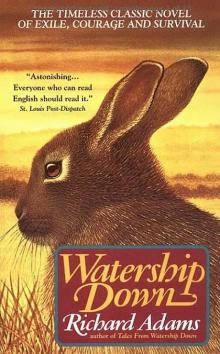 Watership Down
Watership Down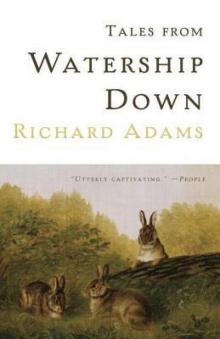 Tales From Watership Down
Tales From Watership Down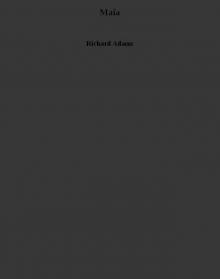 Maia
Maia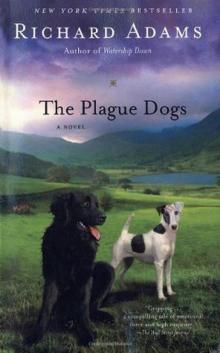 The Plague Dogs
The Plague Dogs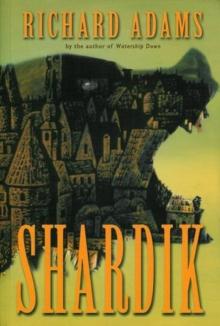 Shardik
Shardik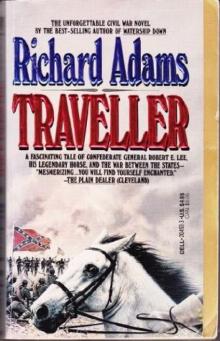 Traveller
Traveller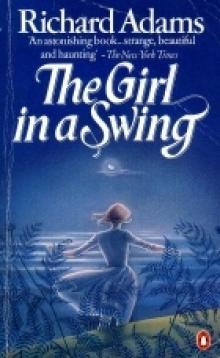 The Girl in a Swing
The Girl in a Swing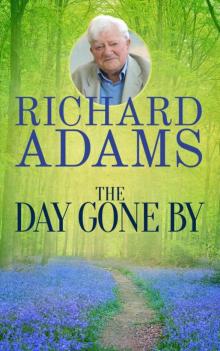 The Day Gone By
The Day Gone By Daniel
Daniel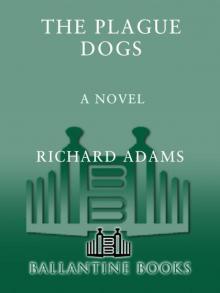 The Plague Dogs: A Novel
The Plague Dogs: A Novel